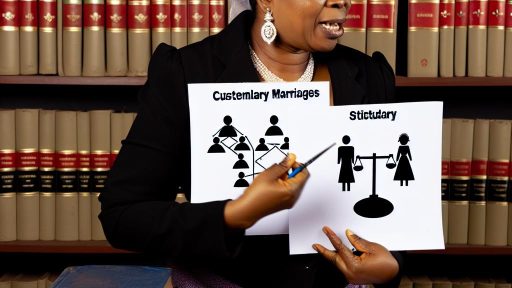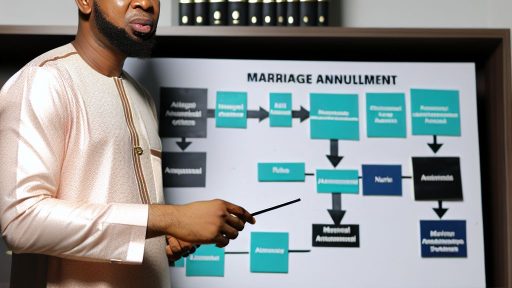Legal Aspects
Legal Aspects of Marriage in Nigeria
Understanding the legal aspects of marriage in Nigeria is essential.
Nigerian marriage laws provide a framework for marriage processes and rights.
Types of Marriages in Nigeria
1. Customary Marriage
Customary marriages follow traditional customs and practices. They vary among different ethnic groups.
Key Elements:
- Bride Price: The groom’s family pays a bride price.
- Ceremonial Rites: Specific traditional rites are performed.
- Community Involvement: The community witnesses and participates in the ceremony.
2. Statutory Marriage
Statutory marriages are governed by Nigerian law. They provide legal recognition and protection.
Key Elements:
- Registry Office: The marriage is registered at a government office.
- Legal Documents: Couples sign a marriage certificate.
- Witnesses: Two witnesses must be present.
3. Islamic Marriage
Islamic marriages follow Sharia law. They are common among Muslim communities in Nigeria.
Key Elements:
- Bride Price (Mahr): The groom provides a specified amount to the bride.
- Imam’s Role: An Imam conducts the marriage ceremony.
- Witnesses: At least two witnesses are required.
Legal Requirements for Marriage
1. Age Requirement
The legal age for marriage in Nigeria is 18 years and both parties must meet this age requirement.
2. Consent
Both parties must freely give their consent to marry.
Forced marriages are illegal in Nigeria.
3. Notice of Marriage
Couples must give a notice of marriage at the registry.
The notice must be published for 21 days.
Process:
- Submit Notice: Fill out and submit a marriage notice form.
- Publication: The notice is displayed publicly.
- Objections: Any objections must be raised within 21 days.
4. Marriage Certificate
A marriage certificate is issued after the marriage is registered. It serves as legal proof of the marriage.
Steps:
- Registration: Register the marriage at the registry.
- Signing: Both parties sign the marriage register.
- Certificate Issuance: A marriage certificate is issued.
Legal Rights and Responsibilities
1. Property Rights
Spouses have legal rights to property acquired during the marriage. This includes jointly owned and individually owned property.
Key Points:
- Joint Ownership: Property acquired together is jointly owned.
- Individual Ownership: Property owned before marriage remains individual property.
- Inheritance: Spouses have inheritance rights.
2. Child Custody and Support
Legal aspects cover child custody and support and both parents have responsibilities towards their children.
Key Points:
- Custody: Custody arrangements are made in the best interest of the child.
- Support: Both parents must provide financial support.
- Visitation Rights: Non-custodial parents have visitation rights.
3. Divorce and Separation
Divorce and separation are governed by Nigerian law. Specific grounds and processes must be followed.
Key Points:
- Grounds for Divorce: Includes adultery, desertion, and irreconcilable differences.
- Process: File a petition in court.
- Settlement: Court determines property division and child custody.
Legal Protections Against Domestic Violence
1. Domestic Violence Laws
Nigeria has laws protecting against domestic violence. Victims can seek legal protection and support.
Key Points:
- Protection Orders: Victims can obtain protection orders.
- Legal Support: Access to legal aid and support services.
- Penalties: Perpetrators face legal consequences.
2. Reporting Mechanisms
Victims can report domestic violence to authorities. Legal and social support is available.
Key Points:
- Hotlines: Access to domestic violence hotlines.
- Police: Report incidents to the police.
- Support Services: Access to counseling and legal aid.
Conclusion
Understanding the legal aspects of marriage in Nigeria is vital. Know your rights and responsibilities to maintain a healthy marriage.
Meet all legal requirements for customary, statutory, or Islamic marriage. Protect your marriage by staying informed about Nigerian marriage laws.
Seek legal advice when needed to navigate complex legal matters. Ensure your marriage remains legally sound by understanding your rights.
Stay proactive in maintaining a healthy and lawful marriage.
Take charge of your marriage by understanding the legal framework.
Stay informed and empowered to protect your marital rights. Prioritize your legal knowledge for a strong marriage.









